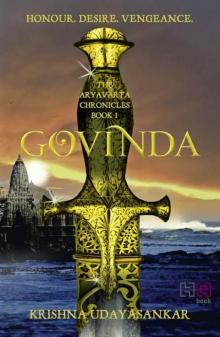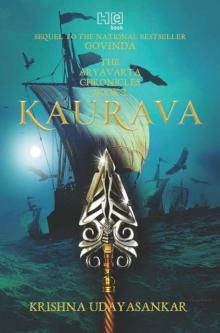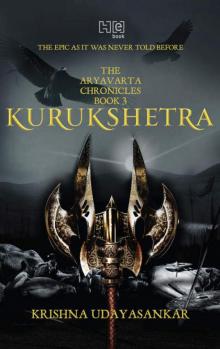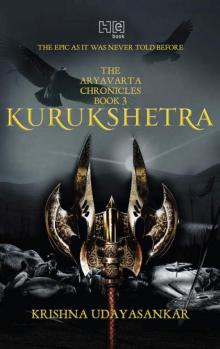- Home
- Krishna Udayasankar
Govinda (The Aryavarta Chronicles) Page 11
Govinda (The Aryavarta Chronicles) Read online
Page 11
‘Your father is a powerful man,’ Govinda began, ‘and this kingdom is one of the mightiest in the entire land. You may not like it, but this makes it a rather complicated political situation. Your wedding could well determine the future of Aryavarta. Surely that’s flattering?’
‘Don’t provoke me, Govinda. I feel like … like …’
‘An animal at a sacrifice?’
‘An animal at a village auction,’ Panchali snapped. ‘And not just any animal. I feel like a cow, because that’s what I am supposed to do – stand there and chew cud till someone grabs me by the tail and takes me home.’
‘Wouldn’t you rather be a cow than a sacrificial bull, Princess?’
Ignoring the bait, Panchali continued, ‘Dhrstyadymn mentioned Syoddhan of the Kurus.’
‘Hmm. He’s a good man.’
Panchali felt anger flood her insides with such venom that it frightened her. She did not understand her rage, but knew she could no longer resist it. ‘Be that as it may, I don’t want to marry him,’ she stated, feeling very much like a stubborn child.
‘Why not? He’s a very handsome fellow …’
‘Hah! More handsome than you, Govinda?’
‘No one’s more handsome than I am, Panchali!’
‘Then, I shall marry you …’
‘But I’m a bad choice. Don’t you know? The people of Dwaraka are mere cattle herders, our vagrant chiefs not the least. You’d be treated like a cud-chewing cow. You should marry a brave warrior. Don’t you love some warrior, Panchali?’
‘Only you, Govinda. Only you.’
‘Careful, I’ll hold you to that,’ he said, beaming joyfully at their interchange.
Panchali longed to reach out, to touch him, to feel the warmth of his skin. She laughed at her own thoughts, her dark eyes sparkling, and impulsively took his hands in a friendly grip. Govinda grinned at the sight of her small, graceful hands wrapped around his much larger ones. She was dark-skinned, just as he was, dark and alluring as the night. But where her skin was the sultry copper glow of a storm-clouded sunset, his was the cool, translucent obsidian of moonrise.
Slowly, he pulled his fingers out from between hers. She reacted with a look of surprise, but quickly hid it. Standing up, she began to pace the room, trying not to let her embarrassment and disappointment show.
Govinda smiled in his characteristic way, a slight curve at the edge of his lips, as if both amused and sad at some private, secret thought. Leaning back against the cushions with an exaggerated sigh, he said, a hint of the smile in his voice, ‘Ah, Panchali. Have mercy on your suitors … What man could resist you, resist his desire for you? Do you know how many hearts you’d break if some crownless cowherd were to steal you away?’
Panchali did not stop pacing as she glared at Govinda. Her supposedly impeccable beauty meant little to her beyond the evaluation of her value as a breeding animal – eyes, ears, nose, all properly set and working well; slender fingers on strong hands to wait tirelessly on a husband; childbearing hips that curved wide from a small waist; and firm breasts to suckle children. She was beautiful, yes, but surely there was more to her than just that.
Meanwhile, Govinda continued in a dramatically lovelorn tone, ‘Like Ahalya of old, the Creator has made you peerless. Truly, your beauty knows no bounds.’
Despite herself, Panchali laughed at his choice of words. Ahalya was a woman cursed to turn into stone for her passion. Only Govinda could speak of her with such reverence, she reflected. Putting on a coquettish expression, she petulantly complained, ‘How would I know? I’m only what you see me as – the childish, useless princess of a powerful nation. Besides,’ she said, feigning an offended pout, ‘it would make for very dull gossip if the princess of Panchala were anything but attractive.’
Govinda laughed. ‘You foolish girl! Have you never seen yourself in a mirror that you need me to tell you this? Don’t you have any idea how exquisite you are? Whether you like it or not men will yearn for you to the point of being driven to madness.’
‘I don’t care,’ Panchali shouted, as her patience snapped. Exhaling hard, she lowered her voice and repeated, ‘I don’t care. I don’t want to marry any of them. I don’t love any of them. I know that’s the whim of a spoilt girl and has little merit for reasons of state. But I just don’t care, Govinda.’
‘You don’t care, or you won’t care?’
‘Damn you! You could milk a bloody bull with your words.’
‘I am a cowherd, Panchali.’
‘Fine!’ she said, furious now. ‘I don’t and I won’t. Does that please you?’
‘It’s rather simple then, isn’t it?’
‘Is it?’
Govinda gave her an exaggerated look of bewilderment. ‘You don’t care, do you? So why should it bother you?’
Panchali ignored the jibe. ‘Please …’ she said. Coming closer, she knelt down on the floor before him in a gesture of earnestness and trust. ‘Please, Govinda. I know you can.’
‘You know I can do what, Panchali?’
‘Marry me, Govinda.’
There was no levity in the suggestion, only unabashed innocence and stark, painful sincerity. Govinda studied her for some time, gazing deep into her eyes. Then he reached out to place a hand on her head. It was an incongruent gesture, one that held far too much tenderness to be a benediction or a patronizing pat. But his voice was cold as he told her, ‘I can’t, Panchali, my love. You know I can’t.’
‘Why not?’ she asked him, adding, ‘and do me the courtesy of telling me plainly, Govinda. Don’t insult my intelligence or my respect for you by bothering to lie.’
Govinda leaned forward, resting his elbows on his knees. He took her hands gently in his and said, ‘You must know that I care immeasurably for you. But if I married you, it would put far too much at risk … After a long time there’s a chance for stability in the realm, a chance to create alliances of trust rather than arrangements based on political intrigue. I owe it to my people and to those who’ve placed their trust in me to do what is best for us all.’
‘And what of me? Do you owe me nothing?’
‘Ah, Panchali. You … you’re a wondrous dream, a dream that fills me with purpose. You have fire in your soul and radiate hope in a world where everyone is resigned to a life of defeat … You are why I make this choice, don’t you see? ‘
Panchali stared at him, incredulous. ‘Why must I be your dream, your purpose, when you won’t be mine? Do you not see … the very hope I feel is because of you?’
‘Why must you always respond with a question?’
‘Why do you never answer mine, Govinda?’
‘Is that what you want?’
‘Is that what you’d willingly do?’
‘Will you stop?’
‘No. Will you?’
Govinda said nothing, and a strained silence followed. Finally, he spoke. ‘I can’t give you what you want, Panchali,’ he softly confessed. ‘I can neither fulfil your dreams nor protect you from your fears …’
Panchali stood up in a single graceful move. ‘I understand,’ she said, her face taking on a polite distance. ‘Govinda Shauri always has a plan, doesn’t he? And now his plan involves using me as though I was of no consequence at all …’
‘You amaze me. Surely you’d know by now what is of consequence to me and what isn’t?’ ‘
Panchali opened her mouth, intending to say something extremely nasty but gave up in disgust. ‘What about me?’ she simply asked.
Govinda burst out in a short, incredulous laugh. ‘Aren’t we both guided by the same belief that a family is more important than the individual, the village more than the family, the nation more than the village, and a federation of nations, an empire, greater than a single nation?’
‘What does it matter to you what I believe in?’ Panchali snapped.
‘Because we have to give up certain things to stand by what we believe in. Emotions, affections – these things just get in the way of what needs t
o be done. The question is, are you willing to make the sacrifice it’ll take?’
‘By Rudra,’ Panchali said in a horrified whisper, ‘what kind of a man are you?’
Govinda’s lips curved in a noncommittal gesture. ‘I’m just a calculating instrument, Panchali, an unbiased measure of the greater good.’
‘Why would you do that? Why become this … thing, this horrible, insensitive thing?’
‘Ah, Princess, what you call inhuman is just dispassion. Without dispassion, we cease to be creatures of reason, and that’s the worst thing we can be. But this isn’t what you want, is it? I know what goes on in that pretty little head of yours. You want fame and glory; you want to be part of such great deeds that minstrels will sing of you for centuries to come. But I can’t offer you that. You’d be rather unhappy with me, I think.’
Panchali regarded Govinda with an unfathomable expression.
He stood up and started to say something, but she snatched her hands out of his grasp and sharply turned away. In a cold, regal tone she said, ‘You’d better leave. I’m to be married very soon.’ Scathingly, she added, ‘Go away, Govinda. The sight of you disgusts me.’
Panchali willed herself not to show any emotion, even though all she wanted to do was spin around and slap Govinda hard for rejecting her in such a callous manner. Shaking with fury and pain she began to walk away, but Govinda reached out and grabbed her wrist. She resisted, refusing to look at him. He laughed at what he saw as petulance, and stepped closer. Panchali tried to ignore his touch, his warm breath on her shoulder, the sensation of having him so close to her. She closed her eyes, unable to understand whether she cherished or hated every moment that they stood this way.
Govinda let go of her wrist, and Panchali almost gasped out loud at the loss. She felt his fingers pull gently at the jewelled pin on the crown of her head. Ever so carefully, he undid the tight, complex braids into which her hair had been set that morning, his fingers weaving through the dark waves of her hair, soothing, comforting. Panchali soaked in every sensation, as he combed each long strand gently with his fingers. She revelled in the very smell of him, mingled with the faint aroma of flowers from her hair. There was something indescribably intimate about the moment. It would be her secret to keep, she decided. He need never know what she felt.
Her eyes fluttered open and her dark, thick lashes glistened with a hint of tears. She studied the lines of his face, etching every curve, every angle into her memory. His eyes were constant, a deep, dark ocean of endless existence. She teetered, suddenly dizzy, and let herself go limp, dreaming of drowning in that eternal ocean, praying silently that it could be so.
Govinda quickly held her, hissing in surprise at her childlike surrender as she let him take her weight. With a wistful shake of his head, he steadied Panchali back on her feet and let go. Instinctively, she reached out to him. He took her hands and squeezed her fingertips in reassurance. Looking steadily into her eyes, he took a couple of steps back, letting her fingers slip out of his grasp till his hands were empty.
They stood in quiet stillness. Somewhere in the palace a gong sounded loudly, announcing to the various guests that the evening’s festivities were soon to begin.
‘I must go,’ Govinda said, gesturing with his head in the direction of the banquet hall. ‘I’ve strained your father’s goodwill enough by coming here tonight.’
Panchali dully nodded. Govinda placed a quick, light kiss on her forehead and left. She heard him start whistling a tune as he walked down the corridor, as if he did not have a care in the world.
14
‘IMPOSSIBLE!’ DHRSTYADYMN EXCLAIMED IN A HUSHED VOICE.
He stood on a dais that commanded a full view of the huge arena. Every pillar and alcove had been decorated with flowers. Golden statues, each the size of a man, gleamed as sunlight streamed in from the circular opening overhead, and auspicious symbols drawn in fragrant pastes on the floors and the walls filled the space with a heavenly smell. Rows of seats for the contestants and royal spectators rose step-like along the walls and the King’s ornate throne had been set at the highest level, facing the dais. A pool of crystalline water sparkled in the middle of the arena. From this pool rose a towering pole, on top of which revolved a wheel set with five spokes. At the outer edge of each spoke was the metal sculpture of a fish, hardly larger than the palm of a hand. Despite the minuteness of each statuette, the metal fish had been wrought with immaculate attention to detail, right down to the black orb inside the eyes. Five arrows, one each to pierce the five fish-targets, were arranged on a velvet-lined tray that rested on a low table near a massive, unadorned stone slab, now empty. A powerful iron bow, crafted in the purest of fires and wrought on the hardest of stones, rested askew on the marble floor of the arena.
Next to it, Syoddhan of the Kurus lay in a stunned daze. The rest of the hall was still.
The silence broke. The air filled with shouts and yells. Competitors and spectators alike sprang from their seats and clambered towards the fallen man. Vasusena, the King of Anga and Syoddhan’s dearest friend, pushed through the unruly crowd and ran forward to help him. Syoddhan waved him back and slowly stood up. His fingers were still wrapped around the bow. With resigned steps he walked up to the stone slab, set the bow back on it, and returned to his seat. Many of the other contenders, who milled around awaiting their turn, tried to ask him what exactly had happened. He did not even look up.
Panchali was as astonished as everyone else, but she remained as she was on the dais, next to Dhrstyadymn. She tried hard to show no reaction, staring instead at her henna-decorated hands, the fine golden weave of her silk robes, the heavy bangles on her wrists. They proved to be of little use as distractions. Closing her eyes, she tried to focus on the less pleasant sensations she felt – the mild irritation of her large, round earrings brushing against her cheeks, the way her heavy waist-girdle seemed uncomfortably constricting and, above all, the many eyes boring into her, evaluating her usefulness in more ways than one.
Finally, she gave in and glanced at Govinda, sitting on the balcony with Balabadra and the others of their family. He did not seem in the least taken aback and was whispering something to his brother, the expression on his face pleasantly ambivalent. He caught her looking at him and winked cheekily at her before continuing with his conversation.
Panchali turned away at the touch of a hand on her arm. Dhrstyadymn apologetically met her eyes. ‘Panchali …’ he whispered, not knowing what more to say or do.
‘Hush. It’s not your fault. We’ve all been misled …’
Her quiet acceptance cut Dhrstyadymn to the core. He felt sick, enraged even, and wondered if perhaps he ought to do something, anything. Image after terrifying image flashed through his mind, of what might happen next. He tried to think, shutting out the sounds around him – the rising tumult, Panchali calling to him, her touch as she desperately clawed at his arm. Then he heard the twang of a bowstring. Before he could look, the bow sang again – not once, but four times. A stunned silence filled the hall yet again as high above them all the wheel softly creaked to a stop. The five arrows were still embedded in their targets, the metal heads piercing the eye of each wrought metal fish.
The arena exploded with enthusiastic applause and roars of rage. Near the target stood a man dressed in the coarse linen robes of a scholar–sage. His hair had been pulled back into a knot, and a thick beard obscured most of his face. The man’s forearms, however, had the tell-tale scars of a professional archer. As ordered, the bards and musicians in the arena had already struck up a victory song, but the atmosphere was far from the jubilant gathering they lyrically described. Insults and jeers rained down on the dubious victor, who was joyfully embracing four other men, all dressed like him in rough ochre robes.
Dhrstyadymn turned to Panchali. She remained expressionless. Even more anxious than before, he looked to King Dhrupad for guidance, but the monarch was sitting with his head in his hands. He somehow found the words, saying them out l
oud to his sister as though he needed to hear them himself. ‘You’re bound, upon your honour and mine, to marry that man. To marry whoever wins this tournament.’
‘I know,’ Panchali evenly replied.
‘But … I … we …’
The sounds of dispute, of heated words, began to intrude on their strained conversation. Slowly, the two siblings realized that they were not the only ones who found it strange that some unknown, bedraggled scholar could have succeeded where a mighty prince like Syoddhan had failed at the task.
The disgruntled suitors began to hurl accusations of Panchala trickery and sabotage, their rage rising as the full extent of their humiliation slowly sank in. The musicians stopped playing, as Satrajit gave them an angry shake of his head. The murmur of discontent grew louder still, taking on the trappings of an argument. Some of the gathered nobles gestured towards Panchali. Others strode angrily towards Dhrupad, demanding, rather violently, an explanation for the turn of events. Royal guards instantly got into formation and stood in the way of the angry suitors.
‘By Hara! No!’ Dhrstyadymn exclaimed as he emerged from his shock. He jumped off the dais and began to make his way towards the centre of the confusion, Panchali right behind him.
‘Stay here!’ he instructed, over his shoulder.
‘No, I’m coming with you!’
‘Panchali …’
Before he could finish the clang of metal rent the air, followed by loud cries of pain. The nobles had attacked Dhrupad’s personal guards and three of the men already lay dead. More suitors now joined the fight, though some others, including Syoddhan, watched, uncertain what to do. Hopelessly outnumbered, the guards fought on, even as Dhrstyadymn shouted frantic orders to his soldiers. He bounded across the arena towards his father, as did Satrajit, but both of them knew they were too far away.
More soldiers fell and two of the attacking nobles retired, wounded, but many others took their place. The small space at the foot of the stairs leading to Dhrupad’s throne had turned into a battlefield. Panchali winced as she heard the whiplash of a blade descending and the soft, sickening sound of it renting through flesh and bone. ‘Father!’ she cried and ran towards the throne. She was pulled back by a firm hand around her wrist.

 Govinda (The Aryavarta Chronicles)
Govinda (The Aryavarta Chronicles) The Aryavarta Chronicles Kaurava: Book 2
The Aryavarta Chronicles Kaurava: Book 2 The Aryavarta Chronicles Book 03: Kurukshetra
The Aryavarta Chronicles Book 03: Kurukshetra The Aryavarta Chronicles Kurukshetra: Book 3
The Aryavarta Chronicles Kurukshetra: Book 3